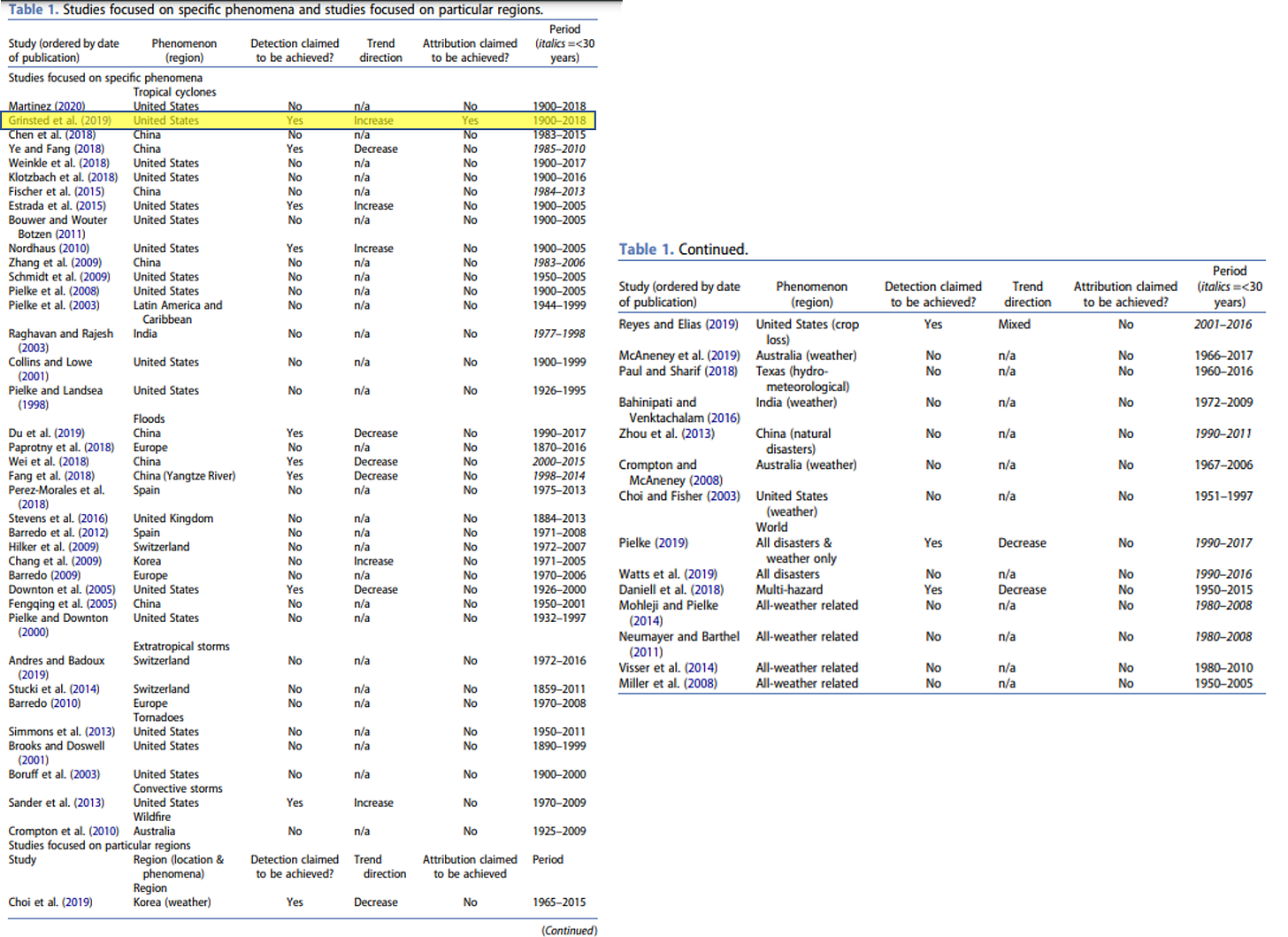Has the IPCC Outlived its Usefulness?
The empty exhortation and missing science of the IPCC Synthesis Report
The Intergovernmental Panel on Climate Change (IPCC) is an important institution. I have often said that if it did not exist, then it would have to be invented. The IPCC is often referred to as a model for how to do a scientific assessment. Consequently, we should have the highest standards for evaluating its work, not least because climate change is important, and effective mitigation and adaptation policies are essential.
Below I share a brief few critiques of the culminating report of the current IPCC cycle, called the Synthesis Report. The new report covers six IPCC reports published over the past 9 years.
Before proceeding, it is important to understand that the IPCC is not a single entity or group of people. It is many different groups doing many different things, with many strengths — for instance, WG1 on extremes was particularly good. The IPCC also has some notable weaknesses — its reliance on out-of-date scenarios most obviously. The Synthesis Report was written by a small group of people. For better or worse, the work of this small group of people reflects upon the entire IPCC and the years of effort leading to this week’s report.
If I were an IPCC participant not involved with the Synthesis Report, I’d be pretty upset. My view is that the IPCC has strayed far from its role to assess the scientific literature in support of policy making. Its has increasingly taken on a stance of explicit political advocacy and as it does so it has ignored and even misrepresented relevant science. The IPCC needs a complete overhaul.
Below are some more detailed thoughts on the Synthesis Report.
Scientific Assessment Minus the Science
Six reports, dozens of drafts, hundreds of authors, thousands of citations, tens of thousands of pages, almost a decade of effort – and after all that, here is the top-line conclusion of the past nine years of work under the umbrella of the Intergovernmental Panel on Climate Change:
“Urgent climate action can secure a liveable future for all”
That’s it. Generic and empty political exhortation that is all-so-common in climate advocacy. No science at all.
What is a “liveable future” we might ask?
Who knows? It is not a scientific term, and it is not even defined by the IPCC. The phrase appears in the IPCC AR6 Working Group 2 report and can also be found in the IPCC Special Report on 1.5 degrees Celsius. It comes from a part of the academic literature that emphasizes “climate-resilient development.”
The new report downplays research showing that extreme scenarios are increasingly implausible and once again centers research that emphasizes RCP8.5 and SSP5-8.5. The report justifies this emphasis when it states in a footnote buried deep in the report:
“Very high emission scenarios have become less likely but cannot be ruled out.”
This is far too clever. An alien invasion next week is also low likelihood, but cannot be ruled out.
None of the relevant literature on scenario plausibility is cited in the Synthesis Report, despite appearing in the most recent IPCC assessment reports. The “cannot ruled out” gambit gives the IPCC a way to keep extreme scenarios at the center of the report while evading any discussion of plausibility.
The coverage of the report has been predictably apocalyptic in response to the IPCC’s framing. Here are a few examples:


IPCC as a Plain Vanilla Advocacy Org

Greta is right that the IPCC didn’t even win the daily news cycle this week. Perhaps that’s because it recycled the exact same messaging (“liveable future”) as it did when it released its Working Group 2 report from just one year ago. Or maybe that’s because the IPCC has reduced itself to the sort of content-free cheerleading that is so common in the climate space: Someone should do something, dammit!
The report emphasizes another phrase – climate-resilient development -- which was also included in the IPCC’s Fifth Assessment Report, which is a lot like motherhood and apple pie, who could possibly object to the idea?
But when it comes to policy specifics, the IPCC is pretty thin. In its press release accompanying the report, the IPCC emphasizes “walking, cycling and public transport.” Um, OK, sure. But the full report makes no mention of nuclear energy, has only a few passing mentions of natural gas, and just one mention of energy access. The report includes a lot of phrasing that sounds like it emerged from a university faculty committee:
Actions that prioritise equity, climate justice, social justice and inclusion lead to more sustainable outcomes, co-benefits, reduce trade-offs, support transformative change and advance climate resilient development.
Sure, that is all great. Where are actual policy options? Not here.
Missing Evidence on Loss and Damage

Perhaps the most glaring omission by the report is on the science of “loss and damage” which is emphasized throughout the report. The Synthesis Report is not the only part of the IPCC that has ignored data and evidence on the economic and human cost of disasters, as I have frequently documented here.
The IPCC makes a big deal about “loss and damage” as a central reason why action is needed:
Economic impacts attributable to climate change are increasingly affecting peoples' livelihoods and are causing economic and societal impacts across national boundaries.
What does the data on “loss and damage” say? That seems like an important question that the IPCC might have explored over the past nine years.
The IPCC doesn’t answer this question, despite such data being readily available and a voluminous peer-reviewed literature on the subject. Instead, the IPCC relies on a series vague, imprecise and readily mis-interpretable statements.
How difficult would have been to include the graph below in any IPCC report of the past 9 years?

Readers here will know that the overall number of weather and climate disasters have decreased so far this century, economic losses as down as a proportion of economic activity and deaths and people affected by extremes are sharply down in recent decades.
In an effort to aid the work of the IPCC in 2020 I published a literature review of 54 studies on loss and damage which quantified the relative roles of climate and development in economic losses from weather extremes. The IPCC not only ignored my review, but in its literature review it also ignored 53 of the 54 papers, choosing to cite only one paper which asserted the attribution of losses to greenhouse gas emissions – the other 53 did not. None of this data or research gets mentioned by the IPCC, which is just remarkable.
Between the IPCC Synthesis Report’s evasion of the most recent literature on scenarios and the games it has played with loss and damage research and evidence, the IPCC is skating close to becoming a source of climate misinformation.
It is time for a new approach.
I appreciate your support. I am embarking on an experiment to see if a new type of scholarship is possible. I am looking to make a break from traditional academia and its many pathologies, and this Substack is how I’m trying to make that break. I am well on my way. Please consider a subscription at any level, and sharing is most appreciated. Independent expert voices are going to be a key part of our media ecosystem going forward and I am thrilled to be playing a part. You make that possible.
The Honest Broker just passed 10,000 subscribers! I’m celebrating with a 50% off limited-time offer.







On further reflection, an organization like the IPCC, that is under the umbrella of the UN is not reformable. Everything that the UN does is driven by the politics of scarcity and over population.
In addition as long as the scientists, economists and analysts that comprise the ipcc are willing to sacrifice their integrity for political and job security purposes, any hope for reform is doomed to fail.
Has the IPCC outlived its usefulness? Since we now are in the seventh year of global cooling, according to NOAA NCEI data, CO2 does currently not seem to have a strong warming effect. Why did IPCC leave out the clarification that two decades of climate change can also be explained by the observed variations in cloud cover plus the effects of El Nino/La Nina ?